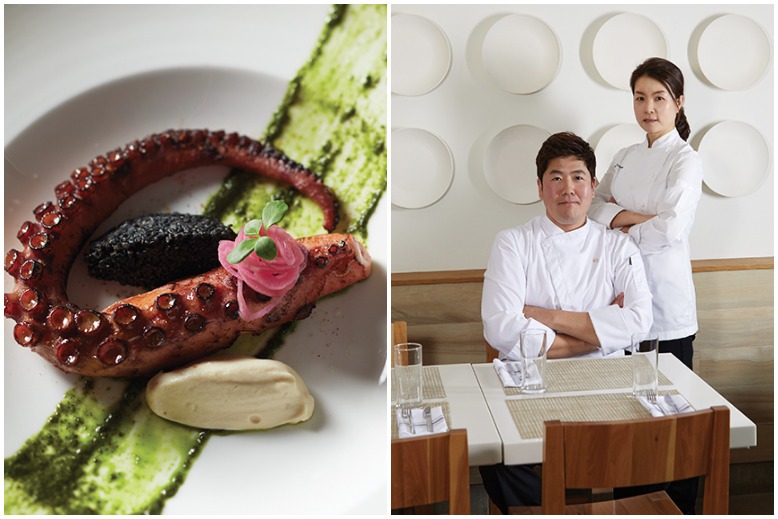



Two students meet at the French Culinary Institute in Manhattan. Korean immigrants, they bond over their shared language and background. Over the years, they remain friends as they raise their respective families, never abandoning their vision of opening a restaurant together. In the spring of 2019, they actually do it. And that is how we get Bloom, their radiant brasserie in Verona.
Joann Chae and Woo Sung Cho have created a bright, modern, friendly space that dovetails with their menu—a contemporary take on French cuisine, incorporating flashes of Korean flavor in ways that range from subtle to thrilling.
[RELATED: 30 Best New Restaurants]
Cho, 37, grew up in his parents’ traditional Korean restaurant in Inchon, South Korea. After graduating from the FCI (now International Culinary Center) in 2011, he spent several years working in the New York kitchens of Jean Georges Vongerichten, Daniel Boulud and Iron Chef Masaharu Morimoto. “I wanted to learn all the different cuisines—except Italian,” he says with a grin. “Wasn’t interested in that.”
His experience in elite restaurants is evident in Bloom’s elegant plating and imaginative pairings. A good example is his sous vide, then grilled octopus—tender, flavorful, often plated as a dramatic loop separating a yin (quinoa black from squid ink) from a yang (white cauliflower purée) against a backslash of brilliant-green salsa verde.

From left: Grilled octopus with yin and yang mounds of black quinoa and cauliflower purée over a streak of salsa verde; chef co-owners Woo Sung Cho and Joann Chae. Photos by Laura Moss
Chae earned a degree in nutritional science in Korea and cooked in traditional restaurants there. Moving to America with her husband and first son in 2001, she completed the chef’s program at the Culinary Institute of America before her second son was born. Later, FCI degree in hand, she started a catering company.
At Bloom, Chae drives the focus on organic and healthful ingredients, and on making the menu as inclusive as possible. For example, jap chae—a traditional Korean stir fry of julienned vegetables and, glass noodles made from sweet potato starch—is naturally gluten free, except for trace amounts of gluten in the soy sauce. Chae formulated a gluten-free soy sauce so that the dish can be enjoyed by anyone.
Both chefs appear to enjoy greeting regulars and making newcomers feel like regulars. They often pop out from the not-quite-open kitchen, which is separated from the counter seats by frosted-glass peek-a-boo panels.
Across the menu, Korean touches enliven classic French dishes. A rustic plate of smoked bone marrow sprinkled with diced, caramelized kimchi balances unctuousness with pleasing acidity.
Escargot are served out of the shell, floating in an unlikely but winning version of Mornay sauce. Classic Mornay is made from butter, flour, cream and cheese. Bloom’s is silky and pale green from a generous amount of freshly torn herbs, which create the illusion of lightness in what is objectively a very rich sauce—one that brings to the fore the delicate, damp earthiness of the snails.

From left: Braised short rib with carrots and crispy potato chips; shelled escargot under a cap of green herb-and-Parmesan-enriched Mornay sauce. Photos by Laura Moss
That crowd-pleasing protein, pork belly, gets an unusual presentation over swiss chard and couscous with swirls of miso sauce and glistening little globes of apple. It is one of the few pork belly dishes you could call pretty, which doesn’t detract from its being pretty terrific.
Our foursome wanted to share an order of wild mushroom soup, so our server brought it to us portioned in four shot glasses. Each tiny serving delivered an extraordinary concentration of mushroom flavor. Equally wonderful, on another visit, was the potato-leek soup.

The view from the sidewalk. Photo by Laura Moss
Entrées change every few months. “We keep some dishes, but we follow the seasons,” says Chae. “Seasons are important.” On our visits, we enjoyed a luscious braised lamb shank brightened with red-cabbage marmalade. A delicious monkfish fillet, served over a rich saffron risotto, was decorated with crisp ribbons of deep-fried parsnip. Indeed, many dishes feature some kind of chip as a garnish. Golden garlic chips added punch to mushroom risotto. Seared scallops came with peas, kimchi purée and a crunchy cumulus cloud of fried tapioca.
The dessert selection varies and is sometimes a bit limited, but the waffle, my favorite, is always on the menu. Made to order from organic Korean wheat flour, it has a crisp shell and a soft, chewy interior. It is topped with a scoop of excellent, house-made vanilla, chocolate or strawberry ice cream.
Brunch at Bloom is every bit as good as dinner. Chae and Cho have devised haute versions of staples such as French toast, eggs Benedict and waffles. There are soups, salads and, from the dinner menu, a novel bulgogi that fills a cast-iron skillet with marinated sliced beef, kimchi-enriched fried rice, a sunnyside-up egg, arugula and grated Parmesan. Somehow, it works.
Korean Street Toast—a light vegetable omelet folded between slices of white pullman toast—seemed more European hotel than street cart. The star of the sandwich turned out to be slices of grilled bacon, unmentioned on the menu but quite welcome.
If you approach brunch with a go-big-or-go-home attitude, I’d point you toward the bulgogi cheese sandwich, a hulking, gooey Korean cheese steak laden with Gruyère, onions, a head-clearing horseradish aioli and french fries. As we lingered over coffee, I spied a girl of six or seven beaming between bites of the incredibly fluffy souffle pancakes. If you enjoy Bloom half as much as she did, you’ll enjoy it very, very much.
Restaurant Details
- Cuisine Type:French/Korean
- Price Range:Expensive
- Price Details:Soups, $8–$9; salads, $15; appetizers, $11–$25; entrées, $25–$42; brunch, $12–$25
- Ambience:Bright and warm; one narrow aisle separates closely spaced tables
- Service:Cheerful and polished
- Wine list:BYO
